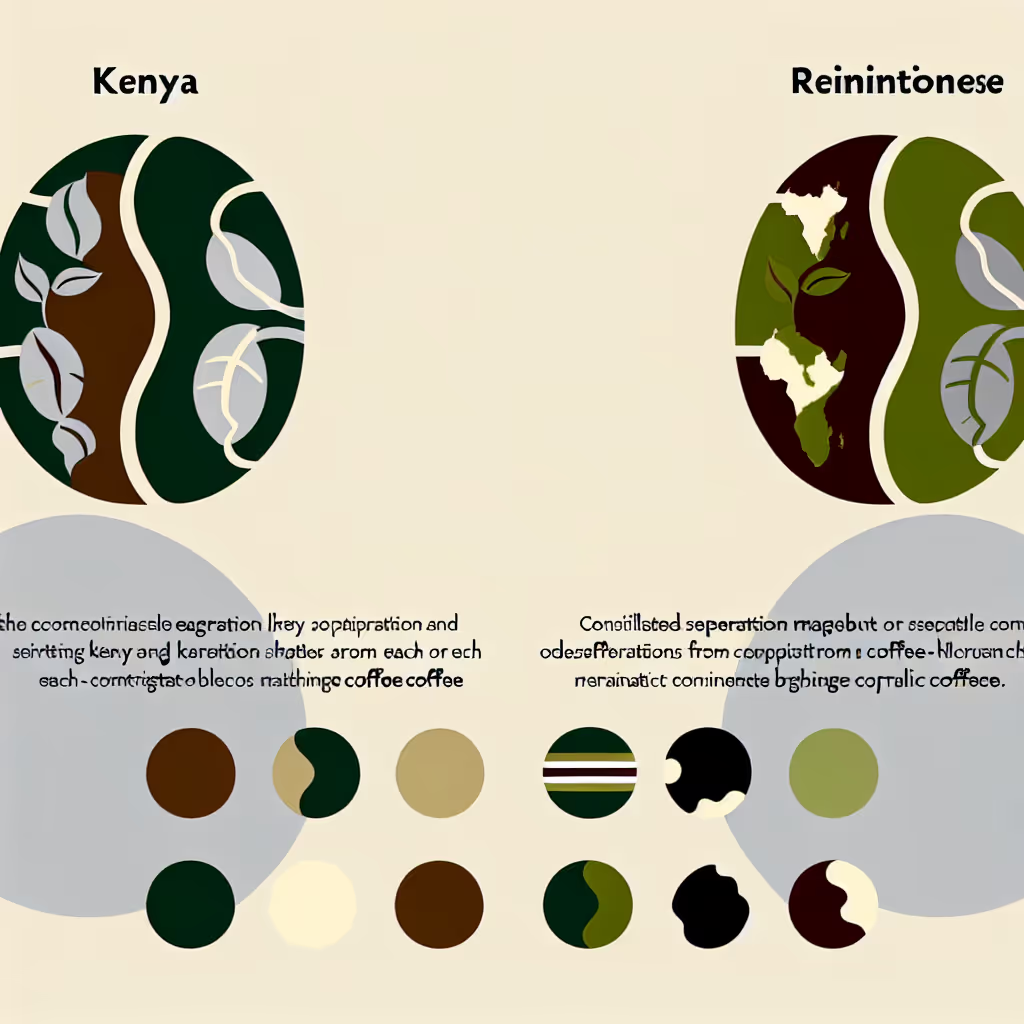Kenyan Vs. Laotian Coffee
This comparison explores the unique qualities of Kenyan and Laotian coffee, highlighting their distinct flavor profiles, growing conditions, and brewing methods to help coffee enthusiasts make informed choices.

Brief Description
Kenyan coffee is renowned for its bright acidity, full body, and complex flavor profile. Grown in the rich volcanic soils of the Central Highlands, these beans benefit from ideal climate conditions and meticulous processing. The result is a cup that's bold, wine-like, and often described as the 'connoisseur's choice'. With notes ranging from blackcurrant to citrus, Kenyan coffee offers a truly unique and memorable tasting experience.
Laotian coffee, grown on the fertile Bolaven Plateau, is a hidden gem in the world of specialty coffee. Known for its rich, full-bodied flavor and unique character, Laotian coffee offers a delightful blend of chocolatey notes and subtle fruit undertones. The high-altitude growing conditions and volcanic soil contribute to the coffee's distinct profile, making it a favorite among adventurous coffee enthusiasts seeking new and exciting flavors.
Importance of Comparison
Comparing Kenyan and Laotian coffee is crucial for coffee lovers seeking to expand their palate and explore lesser-known origins. While Kenyan coffee is widely recognized for its bright acidity and complex flavors, Laotian coffee offers a unique alternative with its rich, full-bodied profile. Understanding these differences helps consumers make informed decisions and appreciate the diverse world of specialty coffee.
Key Attributes
Origin
Kenyan
Laotian


Consumer Guide
When choosing between Kenyan and Laotian coffee, consider your flavor preferences. If you enjoy bright, wine-like acidity with complex fruit notes, Kenyan coffee is an excellent choice. Opt for pour-over or French press brewing to highlight its unique characteristics. For those who prefer a rich, full-bodied cup with chocolatey notes, Laotian coffee is ideal. It works well with French press or espresso methods. Consider the altitude difference: Kenyan coffee grows at higher elevations (1400-2100m) compared to Laotian (1000-1350m), which contributes to their distinct flavors. Kenyan coffee's double fermentation process results in a cleaner cup, while Laotian coffee offers more variety in processing methods, including natural and honey processes.
Expert Opinions
Coffee expert James Hoffmann notes, 'Kenyan coffee often showcases a vibrant acidity that's unmatched, making it a favorite among specialty coffee enthusiasts.' On Laotian coffee, Trish Rothgeb, co-founder of Wrecking Ball Coffee Roasters, states, 'Laotian coffee is an exciting origin that's gaining recognition for its unique flavor profile, offering a delightful balance of chocolate notes and subtle fruitiness that sets it apart from other Southeast Asian coffees.'
FAQs
Kenyan coffee is known for its bright acidity with notes of blackcurrant, citrus, and floral undertones. Laotian coffee, on the other hand, offers a rich, full-bodied flavor with prominent chocolate notes, nuttiness, and subtle citrus hints. Kenyan coffee tends to be more complex and wine-like, while Laotian coffee provides a smoother, more balanced cup.
Kenyan coffee is grown at higher altitudes (1400-2100m) in volcanic soils, contributing to its bright acidity and complex flavor profile. Laotian coffee, grown on the Bolaven Plateau at 1000-1350m, benefits from fertile volcanic soil, resulting in a rich, full-bodied flavor. The altitude difference plays a significant role in developing each coffee's unique characteristics.
For Kenyan coffee, pour-over, French press, and cold brew methods are ideal to highlight its bright acidity and complex flavors. Laotian coffee shines when brewed using French press, pour-over, or espresso methods, which emphasize its rich body and chocolatey notes. Experiment with different methods to find your preferred way of enjoying each origin.
Kenyan coffee typically undergoes washed processing with a unique double fermentation method, resulting in a clean, bright cup. Laotian coffee offers more variety in processing, including washed, natural, and honey methods. This diversity in processing contributes to a wider range of flavor profiles in Laotian coffee.
Kenya produces more coffee annually, with an average output of 50,000 metric tons compared to Laos' 30,000 metric tons. This difference in production volume reflects Kenya's more established position in the global coffee market, while Laos is an emerging origin gaining recognition for its unique offerings.
Both Kenyan and Laotian coffees can be considered specialty coffees, depending on their quality and grading. Kenyan coffee has long been recognized in the specialty coffee market for its exceptional quality and unique flavor profile. Laotian coffee is gaining recognition as a specialty origin, with high-quality beans from the Bolaven Plateau increasingly sought after by specialty roasters and enthusiasts.
Conclusion
Kenyan and Laotian coffees offer distinct and exciting experiences for coffee lovers. Kenyan coffee stands out with its bright acidity, complex flavors, and wine-like qualities, making it a favorite among connoisseurs. Laotian coffee, while lesser-known, is gaining popularity for its rich, full-bodied profile and unique character. When choosing between the two, consider your flavor preferences, brewing methods, and desire for exploration. Both origins provide excellent options for those looking to expand their coffee horizons and appreciate the diverse world of single-origin beans.






